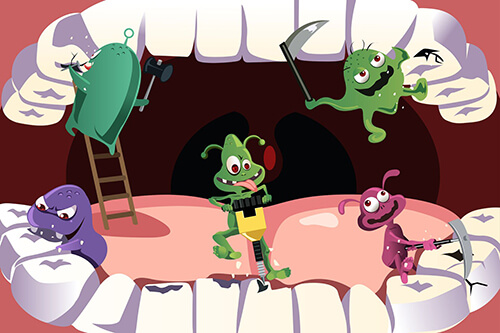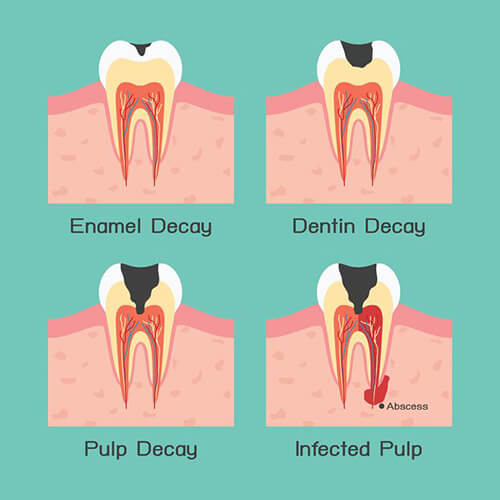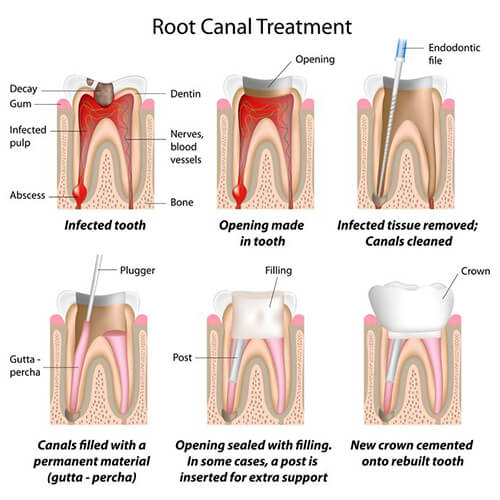Dental caries (scientific term for cavities or tooth decay) is the most common chronic disease in both children and adults (source). Most of us would have had at least one cavity before but what exactly do we know about cavities? We have compiled a list of facts that you should be aware of.
1. Cavities are holes in your teeth.
Cavities are holes in our tooth’s enamel that can become bigger and deeper as the tooth decay worsens. Since our tooth enamel is the hardest substance in our body, it takes time for the cavity to develop.
As seen in the image, cavity starts forming in the enamel, progresses deeper into the dentin (softer inner layer of the tooth) and then ultimately affects the pulp (soft tissue center).
2. Your diet plays an important role in contributing to cavities.
A diet that is high in sugar and starch (carbohydrates) is one of the main contributing factor to cavities. Whenever we consume such foods, the bacteria in plaque (sticky film) interacts with the food to produce acids that attack one’s tooth enamel. We call this acid attack or dental erosion. When these attacks/erosion takes place repeatedly, the tooth enamel will slowly give way to result in a cavity.
3. Some parts of your teeth are more vulnerable than others.
The areas where plaque can accumulate easily are the most susceptible to decay – they include the grooves on the top of the teeth (especially the back teeth which we use to chew our food), in between the teeth and teeth near the gum line.
4. Adults can have cavities too.
Cavities may be more common among children, but it not an issue that only children should be concerned about. Other than cavities that form in the areas mentioned in point three, adults are prone to developing cavities in the roots of teeth (that are exposed due to gum recession) and existing fillings or crowns (may tend to accumulate plaque).
As saliva plays an important role in protecting one’s teeth from bacteria, adults who have dry mouth (xerostomia) all or most of the time, have a higher chance of developing cavities too.
5. There are genes that causes one to be more prone to cavities.
Some people are more prone to having cavities than others – here are a few genetic factors that account for it.
Firstly, teeth that are small and have many, deep grooves are more susceptible to cavities as compared to teeth that are large and have less, shallow grooves. Deep grooves are more likely to accumulate plaque and require thorough brushing regularly.
Secondly, the thicker one’s tooth enamel is, the stronger it is to withstand the acid attacks and the longer it takes for a cavity to form.
Thirdly, misaligned teeth increases the risk of cavities as well. Crooked or overlapped teeth are harder to clean, hence resulting in plaque to accumulate easily. While an improper bite can wear out certain teeth enamel, exposing the dentin.
Lastly, children whose milk teeth fall off earlier to make way for adult teeth are more prone to cavities as good oral hygiene routines may have not been developed yet.
6. You may not feel any discomfort when you have a cavity.
When the cavity is in its early stages, you may not even feel it. Only when it worsens, symptoms would start to show. And when pain is felt, it normally indicates that the cavity has grown deeper into the inner layers of the teeth. Other symptoms may include sensitive teeth, stained tooth surface (black, brown or white) and visible grooves or pits in the teeth.
7. Cavities can be treated.
Various treatments are available for different stages of cavities. If a cavity is detected early, it can be repaired with a filling. Therefore, visit your dentist two times a year to ensure that any problem present is detected early and can be treated effectively.
If a cavity is left undetected for prolonged periods and has progressed to the tooth’s pulp, root canal treatment may be required. Root canal treatment saves teeth that would otherwise be extracted.
8. Cavities can be prevented.
As much as cavities can be treated, the best approach is to prevent cavities right from the start.
Similar to saliva, fluoride protects our teeth by preventing mineral loss in tooth enamel and reduces acid attacks. Fluoride in toothpastes, mouth rinses, tap water in Singapore and fluoride treatments by a dentist, will help to strengthen the tooth enamel. Therefore, remember to brush teeth two times a day and for at least two minutes each.
Also, since our diets play a major part (point 2), keep an eye on your (and your children’s) intake of sugar (soft drinks, sweets, cakes etc). Instead of consuming them in-between meals, it is advised that one consumes them during meal time, when the tooth is already under acid attack. This will help to reduce the total number of acid attacks on the teeth. Limit snacking in between meals to ensure saliva has enough time to repair the teeth from the previous acid attack.
In the case of misaligned teeth and improper bite, orthodontic treatments (such as braces or Invisalign) are effective methods to prevent cavities. Straighter teeth are easier to clean and would also bite better, preventing tooth enamel from wearing out.
| Think you may have cavities? Make an appointment with one of our dental specialist here for a thorough checkup. Have any dental enquiries? Fill in the online form or call us at (65) 6734 9393. |
Please subscribe to our blog and YouTube channel for more interesting updates and dental related topics. ‘Like’ our Facebook page to stay in the loop.








